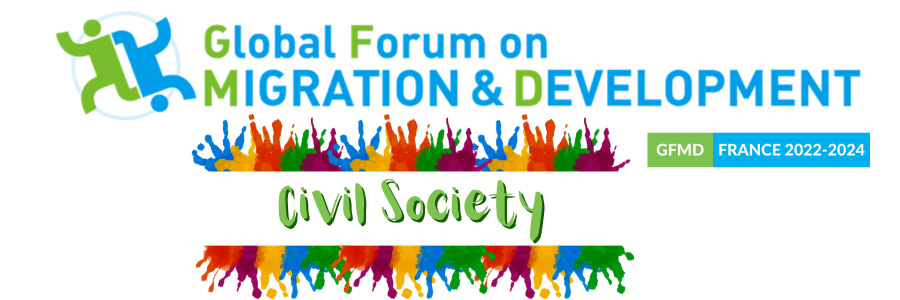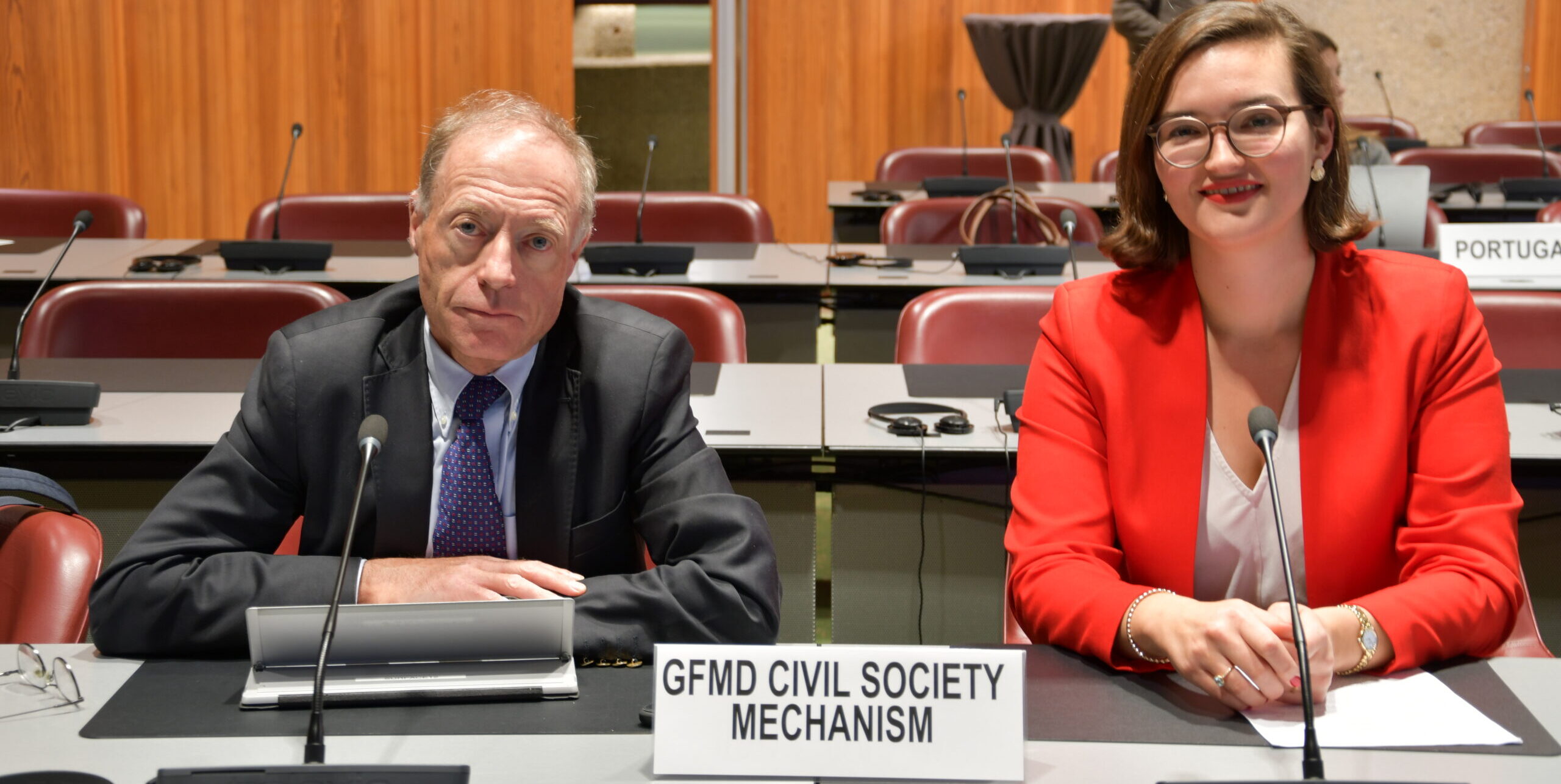On 22-23 November 2022, the French Chairmanship of the 2022-2023 GFMD convened its first preparatory meeting in Geneva, including a plenary meeting of the “Friends of the Forum”, and an initial formation of the six Government-led Roundtable Teams. The hybrid format consultations paved the way for the full engagement of many governments and other actors, including civil society, on the road to the GFMD Summit to be held in Paris in February 2024.
The Friends of the Forum Meeting
The GFMD’s Friends of the Forum (FoF) met on 22 November to discuss technical and thematic aspects of the Chairmanship. As has become the norm at FoF meetings, the three GFMD mechanisms – Business, Civil Society, and Mayors, as well as Youth representatives (through the Migration, Youth and Children Platform – MYCP) actively participated as officially-mandated observers of the FoF.
The most important outcome of this FoF meeting has been a timeline of planned activities during the Chairmanship:
- 29 March: Thematic workshop on labour migration and climate change, Geneva (hybrid)
- 27 June 2023: Culture and Migration event, in Paris at Musée de l’histoire de l’immigration
- January 2024: 14th GFMD Summit in Geneva
A key function of the Civil Society Mechanism is to ensure that the concerns of migrants and priorities of civil society are strongly reflected throughout all the above activities. In this regard, Clara Keller-Skupień, GFMD Civil Society Co-Coordinator, delivered a statement on behalf of the Civil Society Mechanism, emphasising the role of civil society preparations to foster inclusive participation in the GFMD:
‘We will focus on ensuring robust preparation throughout the entire Chairmanship. This will ensure the most representative and best civil society participation in all the GFMD activities and in the Summit in particular. Those who will be attending GFMD activities will be civil society leaders and practitioners with experience and strategic thinking, and representing broader communities and civil society networks. Their contributions to the GFMD will thus encompass the results of a rigorous process of discussions and broad preparatory consultations with their respective constituencies.”
Clara also stated, “The GFMD has always been a critical multi-stakeholder space for open dialogue on migration. We are convinced that – without the GFMD – global migration governance would be at risk of retreating from the gains realised in the past two decades.” She continued, ”we remain hopeful that we can work together to achieve new heights in this Chairmanship, and we urge other Member States to also take leadership for its future.”
This statement highlights how governments’ commitment is essential in delivering a successful GFMD, while also continuing to hold policy dialogues that truly include and reflect the reality on the ground, as witnessed by migrants and grassroots organisations.
Updates on the GFMD Standing Working Groups
The French Chair also focussed attention on the GFMD’s standing Working Groups (WGs). Firstly, the WG on the Impacts of COVID-19 on Migrants, Migration and Development, co-chaired by Switzerland, Indonesia and the Business Mechanism, has concluded its mandate. Switzerland delivered closing remarks on lessons learned and the need to utilize the GFMD to continue exploring the intersecting challenges that migrants face, including around global pandemics like COVID.
Secondly, the WG on Sustainable Development and International Migration needs to be re-invigorated, and Member States have been invited to submit their interest in co-Chairing the WG with the United Arab Emirates (UAE). In the meantime, France will temporarily step in alongside the UAE to prepare the GFMD’s contributions towards the next High-Level Political Forum (HLPF) on Sustainable Development.
Lastly, the mandate of the WG on Public Narratives on Migration (co-chaired by Canada, Ecuador and the Mayors Mechanism) has been extended for another two years. It will build on the success of the #ItTakesACommunity campaign, and expand its work.
Government-led Roundtable Teams
The next day’s sessions were dedicated to the organization and initial meetings of the Government-led Roundtable Teams (GRTs), with designated co-Chairs, participating governments and interested stakeholders. The consultations aimed at (i) gathering initial inputs to prepare active roundtables towards the Summit, (ii) clarifying the roles and tasks of various actors within each GRT, and (iii) providing guidelines for the drafting of their respective thematic discussion papers and narrowing down the guiding questions from the Chairmanship Summary Concept Note.
It is expected that different actors will play a role during the Roundtables at the Summit: Co-Chairs, Coordinators, Moderators, Rapporteurs, Thematic Experts, etc. During each GRT consultation, the GFMD chairmanship outlined a tentative timeline for preparing the draft discussion papers.
The discussions for each GRT were led by the following government co-Chairs:
- GRT 1. The impact of climate change on human mobility: Argentina and Fiji
- GRT 2. Rights and migration: Colombia and Egypt
- GRT 3. Diaspora: Mexico and Moldova
- GRT 4. Labour migration: UAE and Zimbabwe
- GRT 5. Improving the perception of migration in public opinion through narratives: Canada and the Philippines
- GRT 6. Multi-level governance: Azerbaijan and Kenya
The GFMD Civil Society Mechanism will continue to provide timely updates on the GFMD and coordinate civil society participation in coming weeks and months. In the meantime, please subscribe to our newsletter to continue following our activities.

